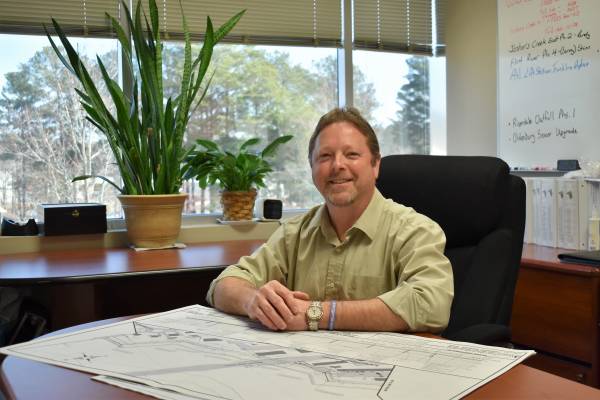Meet Engineering Supervisor Keith Watkins. Keith’s section is responsible for water, sanitary sewer and stormwater designs for extensions and replacement projects, development plan review for water, sewer and stormwater, utilities permitting coordination, and coordination with Georgia Department of Transportation (GDOT) for road projects that will require water and sanitary sewer relocations. He also manages CCWA’s sanitary sewer evaluation surveys (SSES) program, which includes closed circuit television (CCTV), and manhole and smoke testing inspections for capacity and condition assessment.

Engineering Supervisor Keith Watkins
This SSES program provides a systemwide approach to identify sewer pipes that have the potential to fail. “We want to find and repair any bad pipes so that we can keep inflow and infiltration (rainwater or water from a nearby creek or river) from getting in the system. This additional water can overload the design capacity for CCWA’s sewer system and cause sanitary sewer overflows (SSOs). Plus, it impacts our treatment facilities, he adds.”
The intensive inspection work of the SSES program is what drove CCWA to replacing major sewer trunk lines. Since the program began in 2010, CCWA has spent $30 million replacing 7.6 miles of pipe with another $38 million in progress.
“When you are working with sanitary sewer, you’ve got to make sure the contents flow properly,” he adds. “The work we are doing now is having a big impact on the whole sewer system. In the immediate, it impacts pipes, but it also has a positive long-term impact our water reclamation facilities.”
Keith also coordinates CCWA’s regulatory compliance on the Metro North Georgia Water Planning District Plan and interjurisdictional coordination with Clayton County’s cities and adjacent county entities. He is a member of the Clayton Utility Coordinating Committee made up of stakeholders from CCWA, Atlanta Gas, Georgia Power, Comcast, AT&T, Clayton County DOT, GDOT, and GA811. They meet monthly to collaborate on projects and work together to stress the importance of proper utility locates to avoid hitting other utility’s underground infrastructure. He served as Secretary, Vice Chair and Chair of the group, earning awards for each position from the Georgia Utility Coordinating Council.
Keith enjoys the variety of work he is involved in and the variety of people that he gets to work with day to day. When it comes to challenges, he says most of their work now is around developed areas and environmentally sensitive areas like floodplains, wetlands, creeks, and rivers. “We must have a high sense of detail to show the public and regulatory entities that we are designing to high standard while also being financially responsible. There are no easy projects these days.”
Keith has worked for CCWA for 30+ years, beginning his career at CCWA in sewer maintenance (now called Conveyance). After four years in the field, he moved to drafting, working his way up to his current position in 2000. Some projects that stand out include the HQ Building renovation; the building of CCWA’s Atlanta Lift Station, where contractors had to hand tunnel under I-75; managing the filling and draining of the lake at Clayton County International Park for the filming of the Hunger Games; and the difficult and dangerous Frontage Road/I-75/I-285 interchange improvement project currently under construction. CCWA had to relocate $2 million worth of buried infrastructure for this project. One of the coolest projects was being part of building CCWA’s Shoal Creek Reservoir and then being one of the guys that turned the valve to begin filling the lake.
His years of experience has made him one of CCWA’s most knowledgeable about our sanitary sewer system. His contributions to the world of sewer led to him being inducted into the Golden Manhole Society several years ago. Once sewer is in your blood, the love of its complexities never leaves. He still enjoys walking major sewer trunk lines often found in deeply wooded areas running along and across creeks and rivers.
“This position has evolved so that I am involved in many aspects of the Water Authority, across all departments. It has been challenging at times, but equally rewarding,” he adds. #waterprofessional

